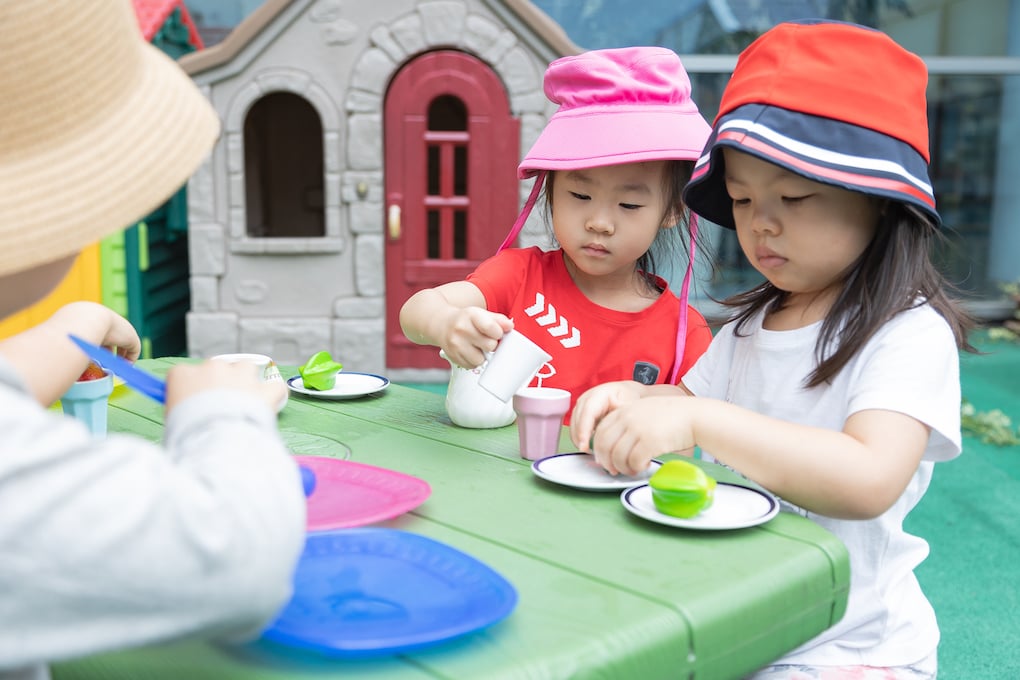This week’s Tuesday Tip is about your young child’s ability to understand the concept of sharing. Now that your child has been in school for half of the year, you might wonder why doesn’t my child like to share?
After all, he is in a sharing environment all day long! Let’s spend some time together with this Tuesday Tip to look deeper into a young child’s development with respect to “sharing.”

Let’s begin with reviewing some recent research about a young child’s ability to understand the concept of sharing. There are many current studies completed by expert child psychologists and pediatricians on this topic. One study done by three experts in child development (N. Chernyak, S. Cordes, and P. Harris: Berkeley, California) shared their results in Berkeley’s Greater Good Magazine. After their controlled study with three- and four-year-old children, they determined that children who struggle to share may not yet have the concept of quantity fully developed. They found that proficient counters were twice as likely to share fairly – divide equal portions – with two individuals. These researchers suggest that you help your child understand quantity first, then fairness will follow.
SUGGESTED SOLUTION: Play counting games with your child frequently (up to 10 at first.) You can set up some stuffed animals and have a tea party with them. Model how every bear receives one cookie (go around the group), then two cookies, and so on, until everyone – including your child – has 3 cookies each. Place beans in cups in the same way. Allow your child to place one bean at a time into each cup until every cup has five beans. Use an empty egg carton to place buttons into each section of the egg carton until every section has seven buttons each. Teach them that every animal, cup, or carton section has an equal number of items. Then celebrate their success. Repeat experiences like this often, so your child begins to understand the concept of quantity.
Another interesting study investigated the concept of forcing a child to share. Have you ever asked your child to share with your friend’s child and they won’t? Did that leave you feeling embarrassed? Then perhaps you took the sharing item from your child and forced it into the hands of the other – creating a screaming fit from your child? It has happened to most parents at some point in time. You may have wondered WHY? Dr. Laura Markham (ahaparenting.com) explains that forcing a young child to share before they are developmentally ready to share can:
- Teach your child that crying loudly will get them what they want, reinforcing an unwanted behavior.
- Parents are in control of who gets what and when, teaching the child that they are not worthy of choice or opinion.
- It’s okay for another child to interrupt your child’s thought process to impose their wants on them, teaching them that it’s okay to be interrupted by a potentially stronger-willed individual (peer pressure.)
SUGGESTED SOLUTION: If you know you will be meeting your friend and her child, plan ahead. Allow your child to help make “goodie bags” for all the children attending the play date. Allow your child to help count the items as you place them into the bag – one cookie at a time for each bag. Yes, let them prepare the bags WITH you. Teach and show your child that every bag is equal, and this is kind and fair for all the children gathering. Then allow your child to give the bags to the other children. This is a great activity to teach sharing and the concept of quantity simultaneously. Do this frequently, especially if your child’s teacher is informing you that your child is struggling to share in the classroom.
A study published in Psychological Science, conducted with the help of over one hundred three-year-old children, presented the interesting finding that in more than 80% of the children studied willingly and gladly shared. There was rarely any arguing or never any fighting. His study suggested that children have a strong and consistent natural willingness to share (even highly coveted items.) This was especially evident in a group environment where the group had to work together to earn a reward which had to be shared.

As usual, my Tuesday Tip will most likely include a list of ideas for developing the skill discussed within the article. Here is a list of ideas for how you can help support your child’s development of “sharing.” This list highlights some of the ideas from Dr. Bill Sears’ article published on askdrsears.com website. Click here to read his full article. (I highly recommend you take time to read Dr. Sears’ full article regarding sharing! It’s great!)
Selfishness comes before sharing
During the second and third years, as the child goes from oneness to separateness, this little person works to establish an identity separate from mother. “I do it myself!” and “mine!” The growing child develops attachments to things as well as persons. This ability to form strong attachments is important to being an emotionally healthy person. After this stage of self-centeredness, the confident child can branch outward to consider others and not lose their sense of self, identity, and confidence.
When to expect a child to share
True sharing implies empathy, the ability to get into another’s mind and see things from their viewpoint. Children are seldom capable of true empathy under the age of six. Prior to that time, they share because you condition them to do so. Don’t expect a child less than two or 2½ to easily accept sharing. Children under two are into parallel play — playing alongside other children, but not with them. They care about themselves and their possessions and do not think about what the other child wants or feels. But, given guidance and generosity, the selfish two-year-old can become a generous three or four-year-old. As children begin to play with each other and cooperate in their play, they begin to see the value of sharing.
Don’t force a child to share
Instead, create attitudes and an environment that encourages your child to want to share. Gradually — with a little help from parents — children learn that life runs more smoothly if they share.
Get connected
A child gives as he is given to. Children who have been on the receiving end of generosity follow the model they’ve been given and become generous persons themselves.
Model generosity when you teach your child to share
Monkey see, monkey do. If big monkey shares, so will little monkey. When someone asks to borrow one of your “toys,” make this a teachable moment: “Mommy is sharing her cookbook with her friend.” Let your sharing shine. Share with your children: “Want some of my popcorn?” “Come sit with us — we’ll make room for you.”
Play games
Give your two-year-old (or four-year-old) some flowers, crackers, blocks, or toys, and ask her to share them with everyone in the room: “Give one to big brother. Give one to Daddy.” You want to convey the message that sharing is a normal way of life and sharing spreads joy.
When to step in
While we don’t expect toddlers to be able to share, we use every opportunity we can to encourage taking turns. Teach your child how to communicate her needs to her friends. Say something like, “When Catherine is all done with the car, then you can ride it. Ask her when she will be done.” Self-directed learning — with or without a little help from caregivers — has the most lasting value.
Time-sharing
Using a timer can help you referee toy squabbles.
Plan ahead
If your child has trouble sharing his toys and a playmate is coming over, ask the playmate’s parent to send toys along.
Protect your child’s interests as you teach your child to share
If your child clings to his precious possessions, respect this attachment, while still teaching him to share and be generous. Before play begins, help your child choose which toys he will share with playmates and which ones he wants to put away or reserve for himself.
Give your child opportunities to share
Oftentimes, you can teach values to your younger children by using older children as models.
With the holidays drawing near and vacation time around the corner, we in the Early Childhood Division of Concordia International School Shanghai hope you will take time to practice sharing with your child and their friends. The Christmas season of giving provides perfect timing to help your child learn this valuable social skill.




